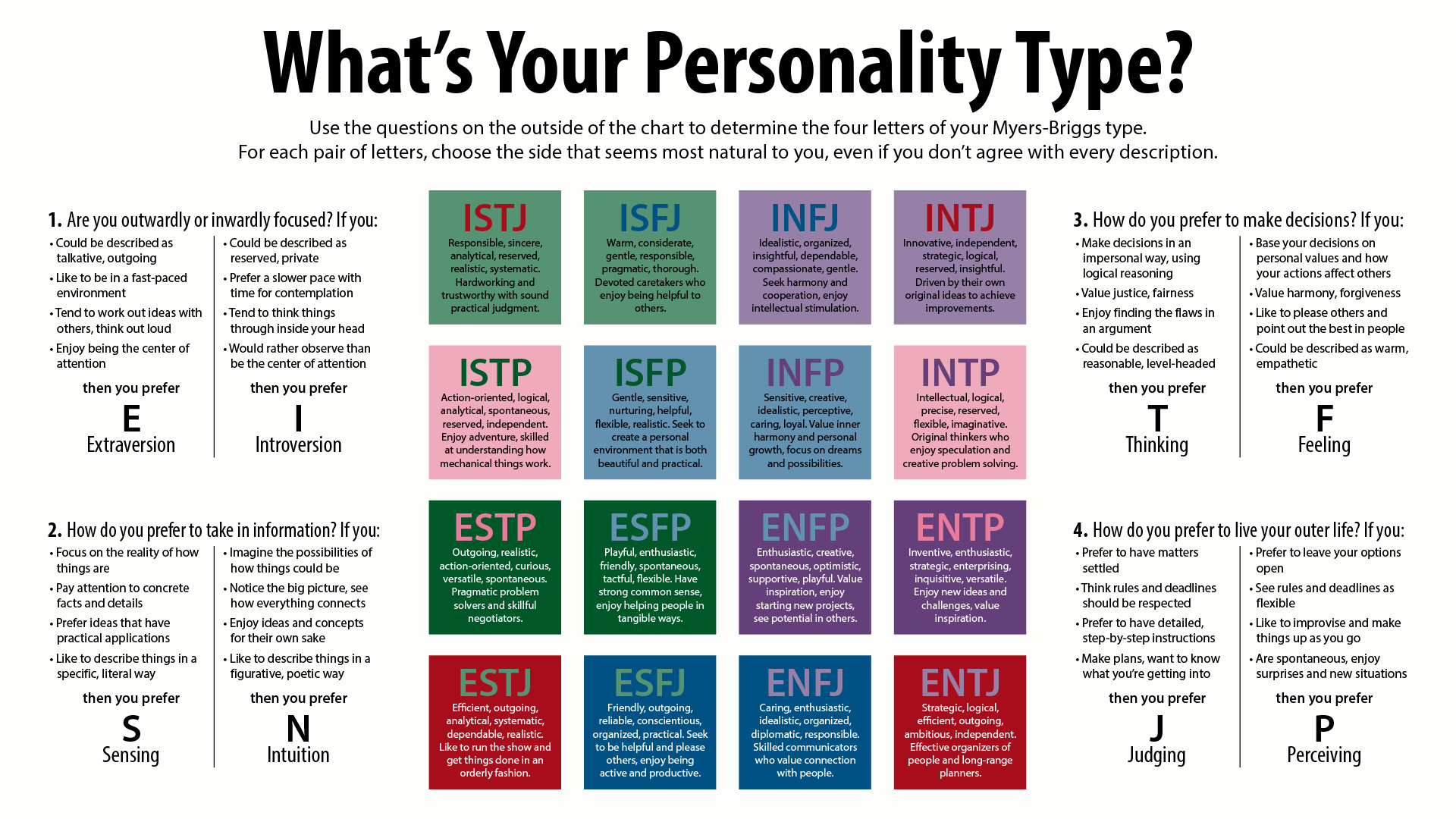What's your personality type and what it tells you?
Created: 09 October 2015
Originally from my blogspot
Have you ever wonder why people think or behave in certain ways? Some of them you might like. Some of them, not so much.
The ways people act can be explained (although not entirely) by their personality type.
One of the most popular methods to find a person’s personality type is by using Myers–Briggs Type Indicator.
Shortly, this model classifies people personalities into 16 types using four indicators.
- Social attitudes: Extroverted (E) vs. Introverted (I)
- Perceiving functions: Sensing (S) vs. Intuition (N)
- Judging functions: Thinking (T) vs. Feeling (F)
- Lifestyle preferences: Judging (J) vs. Perception (P)

People with different personalities perceive the world around them differently, process information in their own ways, and reflex back to outer world. The chart above describes characteristic traits of each personality type. If you want to know your personality type, you can look for one of several free personality tests on the internet using your favorite search engine.
Of course, the 16 personality types are only the extreme cases generated using four indicators and dividing the entire human population into only 16 categories seems to be very crude. Naturally, a person will have an attitude, perceiving functions, judging functions, and lifestyle preferences in between the two extreme cases of each indicator. However, this classification already gives you some ideas about you and others.
Let’s look at an example of myself.
I have an INTJ personality type which basically means I am an introvert, rationally thinking, result-oriented person who likes to make plans for everything. The first time I read an online description about people with this personality type, I cannot help but agreed that a lot of things they say really described me. I value rational thinking and solid reasoning based on facts. I like to have things organized and like things to go as I plan. When looking back to my younger self, I have been like this since I was a little boy.
Does that mean your personality is something permanent? —- No! Definitely not! —-
Although it might take a long time and external factors to change you personality type. I do believe that it is absolutely possible. As solid as it sounds, that’s not the point I am trying to say. The most important thing of growing up (personality-wise speaking) is not to change your personality, but to mature other aspects in the personality checklist.
As mentioned earlier, the 16 cases are only the extremes. By maturing other aspects means you develop senses on the other end of the four indicators and become more well-rounded or at least understand people with different personality types.
What will be the benefits of maturing others aspects in the personality checklist?
In my case, I notice that I was a more INTJ when I was younger. I remember times that I said things to my friends without thinking how they would feel. Although the things I said were true, I ended up hurting their feelings. I was more judging and thought people who live their lives in certain ways are stupid. —- Now I know I was the stupid one.
As I grow older, I have learned to be more considerate about other people’s feeling, to understand there are countless ways to live a happy life, to be more open to new things, and to balance my life. Basically I learned to think the ways people with different personality types do, or at least to understand them.
So, here is my answer to the question regarding the benefits of maturing your personality. You will become a happier person, see the world in different perspectives, and find it a richer and more interesting place than it had been.
In summary, knowing your personality type is a way to get to know yourself. It’s undeniable that your personality type can tell a lot about you, but do not let it define you. Getting to know yourself is only the first step. More importantly, you can use the information to look into yourself and learn about others. To know when to use your dominant traits and when to use their counterparts.
Most importantly, to live a happy, fruitful, and rewarding life.
I definitely sound like an INTJ writing this post, but I guess that’s not a bad thing :)